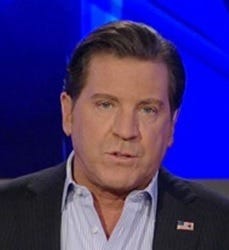Yesterday, Fox News' popular early-evening show The Five led with a huge news story — one that could change the very face of the 2016 presidential election.
No, I'm not talking about that inconsequential drivel about Hillary Clinton having intel from our nation's most secretive, classified government programs on her personal, insecure email server. Who cares about that, after all? I'm talking about something important: Sarah Palin's endorsement of presidential candidate Donald Trump.
It was such a big announcement that co-host Eric Bolling could barely contain his composure as he offered a wide-eyed analysis of its importance to the GOP Primary — specifically the upcoming Iowa Caucus. He called the former Alaska governor's support "big" and marveled at Trump's skilled manipulation of the media.
"Wow," Bolling gasped after digesting some additional good news for Trump: Iowa Governor Terry Brandstad's urging of his state's Republicans not to support key rival Ted Cruz.
It was certainly a big day for Mr. Bolling, who is a personal friend of Trump's, and perhaps his most loyal and enthusiastic cheerleader in the national media. For months, he has willingly sacrificed his dignity to rationalize and defend even the most outrageously offensive, dishonest comments that have come out of the Trump campaign.
Bolling attempted to explain his affection as he closed out Tuesday's segment. "Everyone gives me a lot of grief on Twitter, and even in the building," he said. "for being...for saying some of the things I say about what's going on with the Trump campaign. But I've been saying it for six months...or eight months...and it continues to roll this way. Look...you don't like me... I'm sorry, I'm just calling it the way I see it."
You know, if one didn't understand the context of that homily, they might confuse it for principle — the case of a man standing up for what he believes in, in the face of heavy scrutiny, and sacrificing himself for a strongly-held value.
But that's not what's happening, of course — not if you believe anything Mr. Bolling had said on national television, prior to his friend entering the race. Up until then (for years in fact), he presented himself as a conservative purist. He was someone who readily used terms like "RINO" and "squishy conservative" to describe each and every Republican who he didn't believe committed them self to defending the Constitution (he carries a copy on him), preserving personal liberty, and embracing small government fundamentals. If you didn't pass Bolling's litmus test (and the criteria was awfully strict), Bolling didn't want you on a ballot.
All of that changed the day his friend Donald threw his hat in the ring — a fiscally liberal, pro-entitlement candidate who is at best Constitutionally disinterested. Since then, FNC viewers have witnessed a love that only rivals that of the one between President Obama and Chris Matthews' leg.
Bolling's not alone, of course. The second half of 2015 saw an exodus of ideology from influential conservative-media mainstays. Familiar right-wing voices abandoned their long-held, presumably principled beliefs to throw-in with the candidate who FNC host Greg Gutfeld aptly describes as a "Rockefeller Republican" for his big-government, authoritarian positions.
These players (including Rush Limbaugh, Sean Hannity, Mark Levin, and Laura Ingraham) defected from their own conscientious rhetoric to not only make stunning allowances for Mr. Trump, but outright campaign for him at times. Some now seem to be having second thoughts, but their reservations have come much too late, and others seem ready to take their places.
Even Tea Party icon Sarah Palin, who has long campaigned and spoken out against nearly everything Donald Trump stands for, is now squarely in his corner. Even beyond political ideology, this should mystify people. Trump, after all, scoffed at the notion that Palin's former presidential running-mate was a war hero. He also mocked a man's birth-defect disability (something you'd think would resonate on a personal level with Palin).
Whether these born-again opinion-makers' motivations are to impress a friend, glom onto a fan-base, or retaliate against "the establishment," the results cannot be ignored: our next president's sensibilities likely won't be grounded in conservatism.
What that means for a country with a $20 trillion national debt, an expanding welfare state, soaring healthcare costs, and dangerously low labor-force participation is scary to imagine.
Maybe that's okay with a lot of Republicans. Maybe, as many journalists have theorized lately, conservatism's appeal has been grossly overstated within the party; the poll numbers certainly reflect that. Maybe sacrificing one's ideological beliefs isn't all that heavy of a burden to carry these days.
I mean, if it's so easily done by the movement's loudest, most influential voices, why would we expect those who listen to them to agonize over such conflict?



